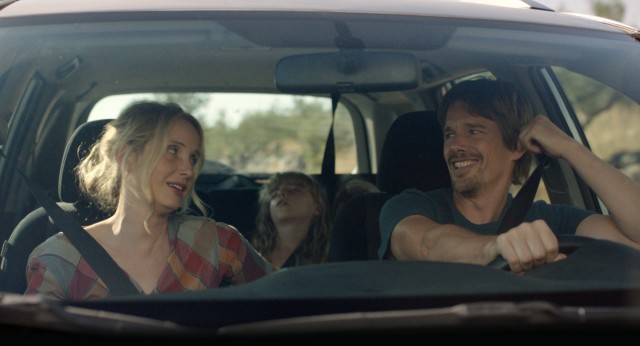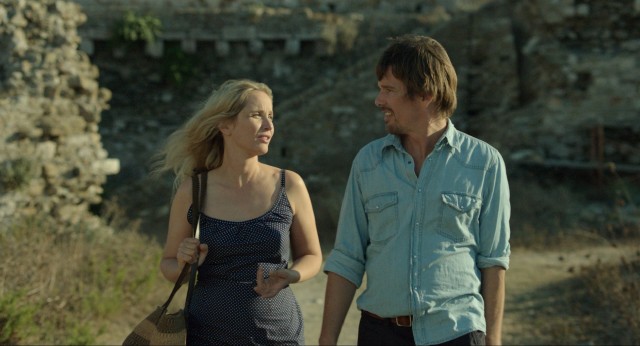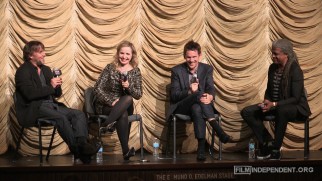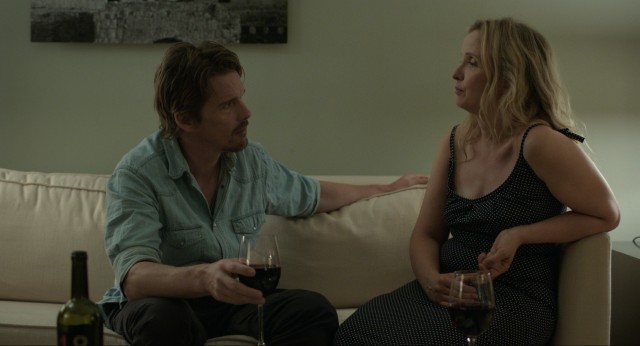Before Midnight Blu-ray Review
 |
Before Midnight
Theatrical Release: May 24, 2013 / Running Time: 109 Minutes / Rating: R Director: Richard Linklater / Writers: Richard Linklater (screenplay & characters); Julie Delpy, Ethan Hawke (screenplay); Kim Krizan (characters) Cast: Ethan Hawke (Jesse Wallace), Julie Delpy (Céline), Seamus Davey-Fitzpatrick (Hank), Jennifer Prior (Ella), Charlotte Prior (Nina), Xenia Kalogeropoulou (Natalia), Walter Lassally (Patrick), Ariane Labed (Anna), Yiannis Papadopoulos (Achilleas), Athina Rachel Tsangari (Ariadni), Panos Koronis (Stefanos) |
Buy Before Midnight from Amazon.com: Blu-ray • DVD • Instant Video
For a film to spawn a sequel, it generally must meet some definition of commercial success. The independent film Before Sunrise, the third theatrical writing and directing credit of Richard Linklater, grossed just $5.5 million in early 1995, possibly turning a profit on its $2.5 million budget but not in a meaningful way. Still, the film was significant enough to Linklater, his co-writer Kim Krizan, and stars Ethan Hawke and Julie Delpy for them all to reunite nine years on Before Sunset. If you're not up to speed, you need to carve out four hours to see Sunrise and Sunset. I'll wait.
Now that you've seen those movies, you know that they involve Jesse (Hawke) and Céline (Delpy), two young strangers who meet on a European train ride and connect on a deep and romantic level throughout a shared night in Vienna. Their story resumed nine years later when their paths crossed again, the American Jesse now an author who wrote about this chance encounter. Their reconnection in Paris recreated some sparks and opened the possibility for a renewed romance, despite the fact that both find themselves in new relationships, Jesse married and with a son.
Midnight extends the narrative, again reflecting the significant real-world time elapsed. Now, Jesse and Céline are in their early forties and in a committed union which has blessed them with twin daughters. The film's first conversation is not between the lovers, but between Jesse and his 13-year-old son Hank (Seamus Davey-Fitzpatrick), who is returning home to his mother, Jesse's ex-wife in Chicago, after having spent "the best summer ever" with his Dad and his Dad's family in Greece. The parting has Jesse considering and lamenting the vast distance that separates him from his son for most of the year. The topic raises the question of whether Céline would consider relocating the family from France to the US. It's a question that triggers guilt, argument, and relationship evaluation. One could expect nothing less from this pensive series.
Like what now amounts to nearly half of Linklater's filmography (including his breakout debut Slacker and the first of his two outings in Rotoscope animation, Waking Life), Midnight unfolds almost exclusively with the exchange of dialogue in virtually real time. The nature and composition of this film become clear in its second scene, which has Jesse and Céline talking as they drive past the ancient ruins of Greece while their daughters sleep in the backseat. The sequence plays out in two impossibly long takes, as the two actors disappear into their characters and this elaborate history they've developed over the past two decades. They discuss Jesse's son, their parental shortcomings, and everything else under the sun. It's all natural, fluid chatter that Hawke, Delpy, and Linklater have carefully worked out but feels like it could be a spontaneous conversation between the world's most masterful improvisers.
Seemingly enjoying the bliss that once seemed unobtainable, the couple comes to show cracks in their enduring relationship. The possibility of relocation raises other complaints regarding personalities, habits, priorities, compromises, and suspected infidelities. These battles, none of them feeling invented out of thin air, reveal the fragility of what has felt like a complicated storybook romance and has sold many copies as one in Jesse's fictionalized novels.
The literary aspect adds a layer of intrigue and intelligence, as Jesse bounces some ideas off of a couple of fellow writers, with whom he has spent the past six weeks engaged in a picturesque meeting of minds. His description of characters plagued by mental phenomena like chronic déjà vu and inadequate or excessive facial recognition are full of poetry and interest. I can think of no piece of narrative filmmaking that compares to this unusual and unusually rewarding franchise. Perhaps the most kindred entity is Michael Apted's Up series of documentaries that has checked in with a diverse group of Brits every seven years. That the Before series can provide documentary-like authenticity from screenwriting demonstrates the passion and care that Linklater and his principals have invested in this fringe pet project that seems to grow in stature with each new installment.
Though news of another sequel understandably raised concerns of diminishing returns, there is now plenty of evidence proving this team will not return to this symmetrical property with insufficient ideas or a wrong direction. In contrast to the typical series lifeline, each new Before film adds to this universe, giving weight and consequence to every moment observed in our novennial peeks. In contrast to franchises always looking ahead and eager to rework past continuity, this one remembers every encounter and is pleased to reference any of them explicitly or recall them in a new light. It may not be the easiest series to jump into here, but that is a good thing for the series as a whole. Though neither of the sequels has recreated the magic of the original film, that each has managed not to sully its charm is a major feat in itself and instantly vaults them into rarefied air.
Though long appreciated, Linklater has never been fully elevated to Hollywood's class of elite filmmakers and there have been enough minor missteps to keep him out of such ranks. But arriving a year after Bernie earned him some rave reviews, Before Midnight may make Linklater impossible to ignore. Opening on Memorial Day Weekend, this sequel quickly became one of 2013's best-reviewed movies to date. Five months later, no other film has amassed as favorable a reaction from as many reviews and only a few have even come close. If critics were deciding, Before Midnight would seem to be a shoo-in for major recognition at many award shows. Unfortunately for it, the road to such glory isn't as simple. This film has the uphill battle of being remembered alongside acclaimed films that have just opened. That will likely hurt its chances to secure more than another Adapted Screenplay nomination (and that absurd "Adapted" designation only refers to this being a sequel) from the Oscars. The Golden Globes could be a different story, as Sony Pictures Classics has chosen to push this movie into the show's less competitive Comedy or Musical categories. It's category fraud, to be sure, this having much drama and few laughs, but it could pay off in the form of two or three additional nominations.
With or without industrial acclaim, Before Midnight is a film of importance and artistry that will long serve as a compelling snapshot of the human mind and relationships. It hits DVD and Blu-ray tomorrow, with the rest of this review covering the latter. VIDEO and AUDIO
Unsurprisingly for a Sony Blu-ray, this disc leaves nothing to be desired in terms of picture or sound. You might not expect it from an indie series so driven by natural dialogue, but the Before films have always boasted a visual splendor from their European locations. Midnight continues that tradition, with sunny Greece providing a picturesque backdrop for this latest relationship study. The 1.85:1 visuals are sharp, vibrant, and pristine.
The 5.1 DTS-HD master audio is also perfectly satisfying. The dialogue that drives the film is crisp throughout and fittingly reflects scenes' environments, while the rare bit of score also resonates nicely.
BONUS FEATURES, MENUS, PACKAGING and DESIGN
The Blu-ray's extras begin with an audio commentary by Ethan Hawke, Julie Delpy, and Richard Linklater. They discuss the film's five scenes plus prologue structure, working with browned apples, the challenge of a long take, the writer whose Grecian house housed the central dinner scene, elements drawn from their experiences and first-hand accounts, unused bits, On the all-HD video side, we open with "Revisiting Jesse and Celine" (7:19). This making-of featurette serves up scenic behind-the-scenes footage and individual and joint interviews with the three key creators, who talk about drawing from their real lives and ending up in Greece.
Next, we get a Q & A session with Linklater, Delpy, and Hawke (37:03), moderated by critic and radio host Elvis Mitchell. They discuss how the film quickly took shape, shooting in Greece, having veteran cinematographer Walter Lassally make his acting debut, the film's big fight, what the movie says about romance, and what it's like to reprise these characters that people have such strong feelings for.
Finally, we get the film's theatrical trailer (1:50), which Sony Pictures Classics "Previews" repeats all the same things that play automatically at the disc's first insertion: a Blu-ray promo followed by trailers for Fill the Void, Love Is All You Need, I'm So Excited, Blue Jasmine, and Austenland.
The menu is a simple static, silent image of Céline and Jesse (the source of the cover image), navigation of which includes some sound effects. As always, Sony equips the BD with bookmarking and resume functions.
In a nod to the fact that this is one of Sony Pictures Classics' more mainstream-appealing titles, Before Midnight includes a code for UltraViolet and Sony Rewards. It's the only insert inside the side-snapped keepcase showing off the studio's customary double-sided artwork.
CLOSING THOUGHTS
More sobering and downbeat than its predecessors, Before Midnight is no less full of life and humanity, as it depicts the latest challenges to be conquered by a romance that began on a whim eighteen years earlier. This conversation-driven drama offers another profound look at these ever-evolving characters we've come to know well and care about deeply.
With good extras and a great feature presentation, this Blu-ray is easy to recommend.
Support this site when you buy Before Midnight now from Amazon: Blu-ray / DVD / Instant Video
|
Related Reviews:
DVDizzy.com | DVD and Blu-ray Reviews | New and Upcoming DVD & Blu-ray Schedule | Upcoming Cover Art | Search This Site
Directed by Richard Linklater: Slacker • Dazed and Confused | Julie Delpy: The Hoax
Ethan Hawke: White Fang • Dead Poets Society • Brooklyn's Finest • New York, I Love You
Midnight in Paris • Amour • My Big Fat Greek Wedding • America America
New: The Conjuring • The Hangover Part III • Stuck in Love • Plush






